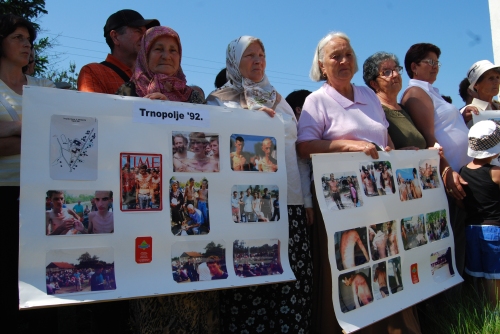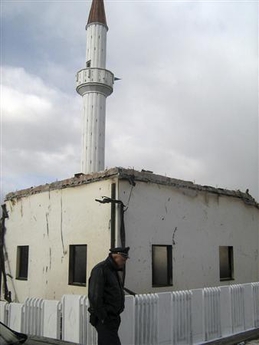I am in Kozarac now, a place in the municipality of Prijedor in North-west Bosnia which was razed to the ground in May 1992, and the totality of its non-Serb population deported, imprisoned or killed. I went today for a commemoration at one of the concentration camps set up at the time to ‘receive’ the non-Serb population of this area, Trnopolje. There I could see in people’s faces the pain. i’ve seen that pain elsewhere in Bosnia, but today it struck me more than it usually does, I don’t know why.
But then I came back to Kozarac and got the news. Tears in everyone’s eyes, not so much of joy, but of surprise…a feeling of disbelief, that a moment in which nobody believed has come.
We turn on the tv, and there is Boris Tadic, President of Serbia, confirming the arrest live, first in Serbian, then in English. There, it’s truth! Now we can believe it. We feel happy, my friend and I, both outsiders, both foreigners. We feel happy and excited, but our excitement is shared by the people here only for a brief moment.
 Photo, this morning, commemoration organized in front of the concentration camp of Trnopolje, in the municipality of Prijedor, by the Victims’ Associations of Kozarac and Prijedor, and the ngo’s Izvor and Srecem do mira…
Photo, this morning, commemoration organized in front of the concentration camp of Trnopolje, in the municipality of Prijedor, by the Victims’ Associations of Kozarac and Prijedor, and the ngo’s Izvor and Srecem do mira…
Update:
After the initial disbelief, then the joy that came with the confirmation of the news, the people of Kozarac simply got on with their lives as they do everyday. As if none of this was actually real. The contrast with the frenzy this arrest is causing in the media, on Facebook, on Twitter, could not be more striking. The contrast is such that I get confused. What is the real world, what is the virtual world, why do I seem more excited about this than these people who were once deported, whose homes were destroyed, their family members and friends killed, or themselves mistreated, abused, who knows what each of them went through… My excitement went away now. What does it mean, this quietude? It means at the very least that the arrest of one of the major responsibles for the tragedy that befell on Bosnia 19 years ago is not a matter for rejoicing.
What is there to expect then? I am told meanwhile that the same reaction was observed here when Karadzic was arrested. What is there to expect? The facts about what happened in the municipality of Prijedor 19 years ago are clear enough. The ICTY and the war crimes chamber in the State court in Sarajevo have produced enough convictions for people not to have many illusions about the benefits of justice in their lives.
This is not to mean that justice is not important. It is, for every single person I spoke to in this community. That is why many of them made the sacrifice of witnessing at the different courts, thus offering their contribution to the discovery of the truth.
But still, despite everything that everybody knows, since in August 6th 1992 Ed Vulliamy, Penny Marshall and Ian Williams came here and the whole world heard for the first time this almost unpronounceable word, Trnopolje, Tr-no-po-lje (yes even now, 6 years after I started to learn this language once known as serbo-croatian and which I now call Bosnian, I still find it hard to pronounce it, and cannot avoid putting the accent on the wrong syllable)… despite what we all saw then, despite the UN Prijedor Report, despite the convictions at the Hague and in Sarajevo, despite the ITN versus LM libel case in the UK, despite all of this, despite the fact that the truth is established and accessible, there isn’t even a memorial plaque in Trnopolje acknowledging that non-Serbs were imprisoned there, mistreated there, raped there, and then all of those who were not killed there were sent other camps, or to exile.
In this place, where a school was turned into a concentration camp and then once again into a school, there is, however, a monument to the fallen soldiers of Trnopolje. Yes, a memorial to Mladic’s soldiers stands there, through which the children pass everyday on their way to school. It goes without saying that this monument is a serious obstacle to reconciliation in this region.
So, in the end, maybe this is one of the reasons why there is no more than a quiet satisfaction here in Kozarac, this place that stands as a rare example of success on the minority return movement. Whatever justice could promise them, it has already been delivered. Now it is up to politics to do the rest. It is for political responsibles to acknowledge the truth that justice has already revealed, and in Prijedor that is a long way from happening. This is is clear not only through the case of the logor Trnopolje, but also through the case of the concentration camp of Omarska. which was set up on a complex of buildings belonging to an iron mining company, which was reverted to its prior use after the war ended and is now property of the greatest multinational of steel and iron, Mittal Arcelor.
And this leads us to the political impact of this arrest. But that will wait for another post.








 (Photo:
(Photo:




You must be logged in to post a comment.